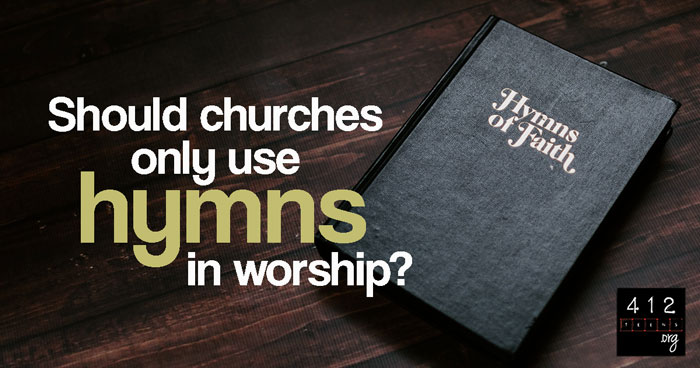What are hymns? Should churches only use hymns?

The songs that we use in church have always changed as quickly as the culture singing them. For a while, music in worship services was in the form we read in the Psalms, accompanied by harp and lyre. Later, in medieval Christianity, “worship music” took the form of chants without instruments. From the 1600s until the past 30 years, church music took the form of verses and choruses intended to be easily remembered and easily sung by a crowd—a form we call hymns.
In the broadest sense, “hymn” has historically been defined as “a song of praise or joy” (according to Merriam-Webster). That very general definition has encompassed “hymn” being used in poetry and other literature to refer to things like nature or even a love interest. That usage has been around since Greek and Roman culture, well before Jesus’s time.
Hymns in Christian Worship
The idea of hymns being tied specifically to Christian worship started almost immediately in the early church. You start to see hymns (hymnos in the original Greek) mentioned in some of the letters Paul wrote, as in Ephesians 5:18b-19: “be filled with the Spirit, speaking to one another in psalms and hymns and spiritual songs, singing and making melody with your heart to the Lord.”
One of the earliest hymns is actually recorded for us in Scripture, which gives us an idea of what “worship songs” might have looked like in the first century:
"Have this mind among yourselves, which is yours in Christ Jesus,
Who, though he was in the form of God,
did not count equality with God a thing to be grasped,
but emptied himself, by taking the form of a servant,
being born in the likeness of men.
And being found in human form, he humbled himself
by becoming obedient to the point of death, even death on a cross.
Therefore God has highly exalted him and bestowed on him
the name that is above every name,
so that at the name of Jesus every knee should bow,
in heaven and on earth and under the earth,
and every tongue confess that Jesus Christ is Lord,
to the glory of God the Father." —Philippians 2:5-11
The word “hymn” continued to be used to describe music used to worship God in various contexts for centuries. But it was really in the 1700s that what WE know as hymns started to explode in popularity. Many churches today have hymnals available to their congregations, which are collections of hymns written over the centuries. Have you ever seen one of these books and wondered where the songs came from?
Where did Christian hymns come from?
The hymns we know today were rhyming verses often set to tunes that already existed—melodies that had been previously used for folk songs or even tavern ballads. One of the first great hymn writers was John Newton, a former sailor (and slave trafficker) from the late 1700s, who famously wrote “Amazing Grace.” Some other great hymn writers who lived and wrote during that century included Isaac Watts and William Cowper.
Hymns in that form became more widely used in church settings in the 1800s, and they were soon adopted as the only form of worship music, enduring into the 1900s. They would be a key source of comfort and communal praise through American revivals and the growth of the modern church.
The Evolution of Worship Music
In the 1970s and '80s, praise choruses started to gain popularity. Praise choruses were shorter songs with fewer lyrics and more modern phrasing. Their introduction into churches quickly caused some concern from older generations—generations who had been raised in a faith that leaned on hymns.
The unknown sound of the newer praise choruses, which were increasingly accompanied by guitars and drums, raised a lot of questions. Should churches stick with the tried and true and sing only hymns? Or should they start implementing new songs more reflective of modern language and trends? Was it considered sinful if a church did not use hymns in their worship?
The instructions in the Bible for worship are usually invitations to simply sing to God—with no "rules" that would cause us to get caught up in details. “Sing to the Lord a new song,” David writes in Psalm 96. Although David was almost certainly not thinking about whether churches should or shouldn’t incorporate electric-guitar-heavy worship songs instead of hymns, what IS clear is that he advocated for new expressions of praise.
As our quick tour through the history of Christian worship music shows, believers have always followed that lead—to create new music for expressing worship toward our Creator. The instruments and trends of each culture and time have been employed by God’s people to worship Him. The wide variety of music styles and instrumentation in worship we see today is proof of how big God is. All musical styles are acceptable to Him; ALL styles, singers, and instruments can worship Him when offered with the right heart. This means that hymns are just one of the many ways we can praise God.
The apostle Paul sums it up well: “Let the message of Christ dwell among you richly as you teach and admonish one another with all wisdom through psalms, hymns, and songs from the Spirit, singing to God with gratitude in your hearts. And whatever you do, whether in word or deed, do it all in the name of the Lord Jesus, giving thanks to God the Father through him” (Colossians 3:16-17).


TL;DR
Christian hymns are songs written for the purpose of praising God. The instructions in the Bible for worship are usually invitations to simply sing to God—with no "rules" that would cause us to get caught up in details. Throughout the years, believers have been creating new music to worship God. The wide variety of worship styles and instrumentation we see today is proof of how big God is. All musical styles are acceptable to Him; ALL styles, singers, and instruments can worship Him when offered with the right heart. The old hymns are just one of the many ways we can praise God.

Writer & Consulting Editor: Mary Nikkel
Mary is a music and nonprofit writer passionate about telling purposeful stories about music, meaning, and mental health. She currently serves as Senior Content Manager for anti-human trafficking nonprofit The Exodus Road as well as providing PR services to bands and start-up nonprofits.
